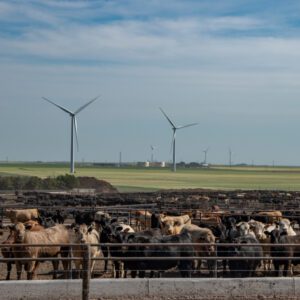

Ammonia Extract: A Sustainable Solution for Advancing Organic Production and Enhancing Soil Health
Ammonia Extract: A Sustainable Solution for Advancing Organic Production and Enhancing Soil Health
Surging consumer demand for organic food—from produce and cereals (grains) to meat, milk and eggs—continues to exceed U.S. producer capacity.
Many factors impact this shortfall, not the least of which is the supply of approved and efficient nutrient sources that organic produce and field crops need to grow, flourish and produce sufficient yield for the grower.
Most notable among these nutrients is nitrogen (N) required by plants in large amounts because it is an essential element for growth and development. Nitrogen is critical for photosynthesis and is a component of nucleic acid that forms DNA, which is important for plant growth and reproduction.
Emerging technology to fill the need.
Ammonia extract is a new technology that provides a naturally derived source of nitrogen with the potential to fill this need, offering significant opportunities for increased organic food production plus sustainability benefits.
Crop nutrition experts with Wilbur-Ellis and Dr. Jerry Hatfield, retired director of the USDA’s National Laboratory for Agriculture and the Environment, believe that ammonia extract is a sustainable source of nitrogen, which when added to organic growers’ toolboxes can be used effectively to grow a wide variety of annual and perennial crops. They also are confident it fits within an organic system as a complement in the addition of carbon sources such as cover cropping and residue management.
“Ammonia extract expands growers’ abilities to provide an abundant organic food supply, and it provides a more environmentally friendly source of nitrogen,” Hatfield said.
“The use of ammonia extract fits right in with the ideals of organic agriculture—to be sustainable and climate-friendly, and to use resources as efficiently as possible. It is part of a circular nutrient management program,” said Loran Kaiser, a crop nutrient expert with Wilbur-Ellis. “Consumers are increasingly asking for organic foods, and the agriculture industry needs to ensure we have progressive and innovative tools and resources to support this surging market and valuable enterprise.”
Derived naturally from a renewable resource.
In nature, through the crucial biochemical process of organic waste composting known as the nitrogen cycle, microbes break down organic matter, such as plant residue or manures, and nitrogen (ammonium) becomes available. However, a portion of the ammonia also can be released into the atmosphere during this composting process.
Wilbur Ellis is committed to capturing this valuable nutrient, before it volatilizes into the atmosphere, upcycling it for use as safeand yield-enhancing organic nitrogen fertilizer. Ammonia extract technology achieves this by drying animal manures as well as various agricultural and pre-consumer feedstocks, then condensing the resulting steam, creating a liquid organic renewable nitrogen fertilizer or ammonium (NH4).
This is not only good for the environment, but it also gives organic growers a sustainable and available nitrogen source that is derived naturally from a plentiful and renewable resource—livestock waste.

Readily available to plants, supports microbial activity, soil health.
Because it delivers N in solution as ammonium (NH4), this renewable nitrogen source also provides environmental benefits. In this form, the nitrogen ions immediately begin to interact and bind with soil particles, becoming readily available for plant uptake and less likely to leach or be dispersed into the atmosphere.
In addition, growers will be able to apply this product in small amounts, through fertigation or irrigation systems, spoon-feeding plants the nutrition they need while allowing soil microbes to remain busy doing their work to break down crop residue and carbon, enriching the soil. Because soil microbes won’t be occupied with nitrification of other commonly applied N sources, renewable nitrogen will allow microbes to thrive within the natural cycling of nutrients.
Enhances carbon capture and crop yields.
In this way, renewable nitrogen also will enable growers using minimum till or no-till systems to increase their carbon input without the concern that their applied nitrogen will get tied up and be unavailable to crops, limiting their yield potential.
“Carbon is the energy source for microbial systems,” said Hatfield. “When we supply the soil with both carbon and nitrogen, we see a positive response in soil microbial activity, which in turn affects plant growth, leading to more root exudates that further enhance soil biology. All these effects are positive to the soil system.”


In fact, studies show the targeted use of liquid fertilizers can be more beneficial to the soil ecosystem and surrounding water systems than the application of large amounts of manure or even compost, both of which are commonly used in organic systems to supply nitrogen.
In many cases manure and compost must be over-applied to provide enough nitrogen to the crop, often taking months to become available to plants, creating the potential for runoff into surface waters. Manure application also over supplies other nutrients, resulting in nutrient imbalances in the soil.
But liquid nitrogen fertilizer can be applied in a targeted way that will match the uptake curve of the crop, optimizing crop use. In addition, because ammonium in liquid form binds to soil particles, the potential for leaching into ground water is reduced.
“Using a precise drip or irrigation system—unlike an inconsistent manure applicator—we can spoon-feed the solution directly to both the plant and soil at the right rate, time and place. We are applying smaller amounts of nitrogen but enough to last the full season,” Hatfield added.
“From a climate-smart and sustainability standpoint, ammonia extract presents an ideal tool for capturing nitrogen and using it more effectively in the soil,” he said.
“Ammonia extracts can enhance, not decrease, organic integrity.”
Leveraging opportunity through a closed-loop system.
Hatfield pointed out that throughout history, livestock and crop production had been closely tied in a closed-loop system where the crops fed the livestock, and the livestock manure was used to feed the crops. As agriculture industrialized, U.S. crop production became more reliant on commercial fertilizers that are mostly sourced from foreign countries. Manure became viewed as a waste product.
“Today, by adopting novel technologies such as ammonia extract, we can once again leverage the livestock-to-crop nutrient loop, converting an abundant, domestic, renewable resource into a safe and sustainable source of nitrogen that will be certified by state and nationally recognized authorities in which American growers and consumers have confidence,” explained Hatfield.
“It’s also a good way to reduce our dependence on foreign sources of crop nutrients,” Hatfield explained.
In addition, this innovative use of animal manure also captures and separates out other nutrients like phosphorus (P), which can be overapplied due to its prevalence in many livestock manures. Although phosphorus also is necessary for plant growth, over-application can lead to excessive amounts in surface water due to runoff, which can cause explosive growth of aquatic plants and algae.
Driving innovation for a better future.
Ammonia extract is a promising technology with the potential to help organic crop production progress.
“As we continue to refine this renewable nitrogen ammonia extract technology, it will become less expensive for organic growers and likely evolve for use among conventional growers,” said Kaiser.
“Wilbur-Ellis is committed to supporting innovation in crop production, and we believe organic growers who embrace these new technologies will be better equipped to provide the world an abundance of organic foods that have been farmed with sustainability in mind,” Kaiser concluded.
Ammonia extract is a recent example of the investments Wilbur-Ellis has made in bringing innovative crop nutrient solutions to growers. In 2019 the company acquired Nachurs Alpine Solutions® (NAS), a leading specialty liquid fertilizer and chemical manufacturer focused, since 1946, on delivering technology advancements growers need to take their crops to the next level.

